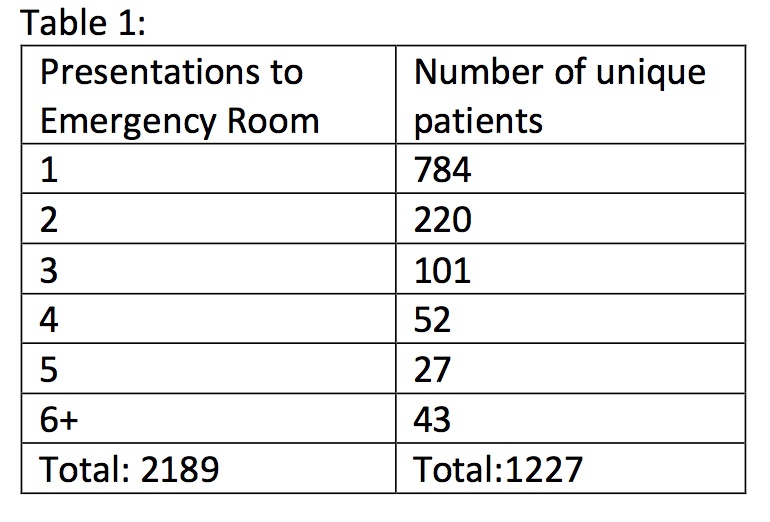Session Information
Date: Sunday, October 7, 2018
Session Title: Epidemiology
Session Time: 1:45pm-3:15pm
Location: Hall 3FG
Objective: To characterize healthcare resource utilization by people with PD by examining emergency room presentations and hospital admissions.
Background: PD is a progressive neurodegenerative condition and prevalence is expected to rise steeply with impending demographic shifts. People with PD have high resource utilization in Canada’s public healthcare system, and development of a comprehensive healthcare strategy for PD requires awareness of current usage.
Methods: A retrospective design identified potential people with PD presenting to a tertiary care hospital emergency room over a five-year period using a two-pronged approach: pharmacy data for all levodopa containing medication orders and diagnostic coding for PD and related conditions. Information on repeat visits, admission rates, prescribing service, and length of stay was collected.
Results: Pharmacy data for levodopa orders identified 2189 presentations to hospital over five years by 1227 unique patients [table1]. 6% of patients had an order for levodopa written by an emergency physician, whereas the remaining 94% had their first order for levodopa written by a consulting physician, and 50% of patients had their first order written only after they were admitted and on an in-patient ward. Diagnostic-coding of PD and related conditions revealed a 90-93% chance of admission from the emergency room, regardless of chief complaint. Compared to the data collected from levodopa orders, diagnostic coding of PD identified only 41% of all patients presenting to hospital. If a diagnosis of PD was coded on the patient record, there was an average length of stay of 25 days, regardless of chief complaint or reason for admission. Patients with PD were most likely to be admitted to Subacute Medicine ward, and average length of stay on this ward was 10 days (29%) longer compared to patients without PD. Further analysis of up-to-date data is on-going and will be completed in the coming weeks.
Conclusions: Most PD patients have a consulting service involved in their emergency room care, and patients are frequently admitted to hospital. A significant group of patients have multiple repeat presentations to hospital. When admitted, PD patients have a longer length of stay. Strategies to increase the availability of rapidly available, ambulatory community care for patients with PD to reduce presentations of PD patients to emergency rooms should be explored.
To cite this abstract in AMA style:
M. Mackenzie, G. Al Momen, A. Yu, K. Sundvick, J. Wright, A. Shiu, S. Appel-Cresswell. Emergency and in-patient healthcare utilization in Parkinson’s disease [abstract]. Mov Disord. 2018; 33 (suppl 2). https://www.mdsabstracts.org/abstract/emergency-and-in-patient-healthcare-utilization-in-parkinsons-disease/. Accessed February 11, 2026.« Back to 2018 International Congress
MDS Abstracts - https://www.mdsabstracts.org/abstract/emergency-and-in-patient-healthcare-utilization-in-parkinsons-disease/

